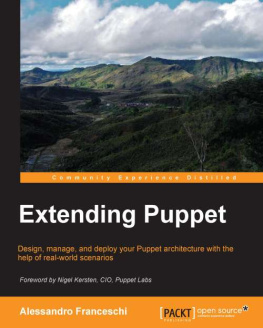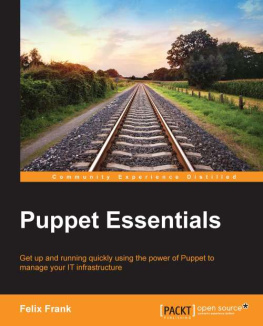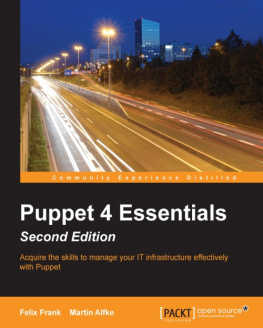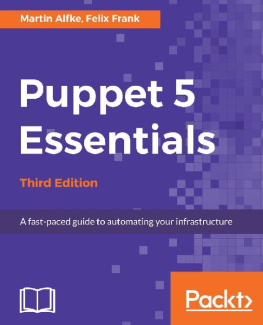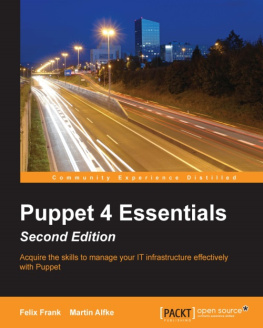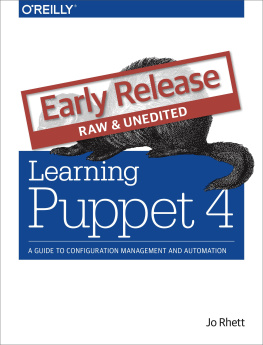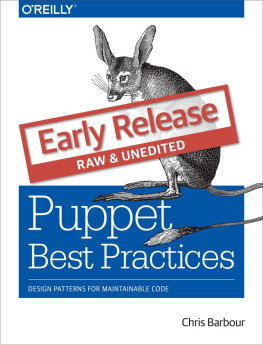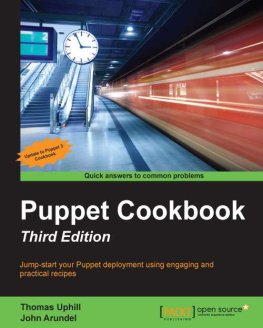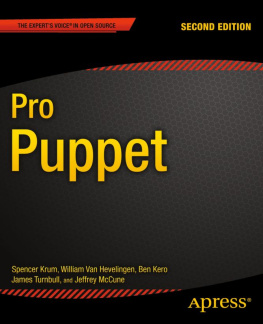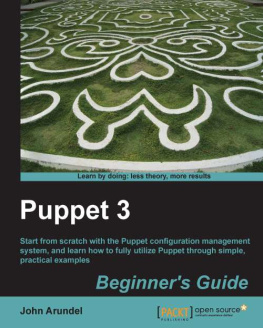Franceschi A. - Extending Puppet
Here you can read online Franceschi A. - Extending Puppet full text of the book (entire story) in english for free. Download pdf and epub, get meaning, cover and reviews about this ebook. genre: Computer. Description of the work, (preface) as well as reviews are available. Best literature library LitArk.com created for fans of good reading and offers a wide selection of genres:
Romance novel
Science fiction
Adventure
Detective
Science
History
Home and family
Prose
Art
Politics
Computer
Non-fiction
Religion
Business
Children
Humor
Choose a favorite category and find really read worthwhile books. Enjoy immersion in the world of imagination, feel the emotions of the characters or learn something new for yourself, make an fascinating discovery.
- Book:Extending Puppet
- Author:
- Genre:
- Rating:5 / 5
- Favourites:Add to favourites
- Your mark:
Extending Puppet: summary, description and annotation
We offer to read an annotation, description, summary or preface (depends on what the author of the book "Extending Puppet" wrote himself). If you haven't found the necessary information about the book — write in the comments, we will try to find it.
.Puppet has changed the way we manage our systems, but Puppet itself is changing and evolving, as are the ways in which we use it.A clear, updated, practical, and focused view of the current state of the technology and the evolution of Puppet is what we need to tackle our IT infrastructure challenges and avoid common errors when designing our architectures.This is a detailed, practical book that covers the different components of the Puppet ecosystem and explores how to use them to deploy and manage different kinds of IT infrastructures.Updated with the most recent trends and best practices, this book gives you a clear view on how to connect the dots and expands your understanding to successfully use and extend Puppet.What You Will Learn:
Use Puppet to manage network, cloud, and virtualization devices;
Become a Hiera and PuppetDB power user;
Study the different approaches to Puppet architecture design;
Master the art of writing and maintaining reusable modules;
Explore strategies and patterns on how to introduce Puppet automation;
Manage and test a Puppet code workflow;
Design scalable Puppet infrastructures.Plan, test, and execute your Puppet deployments.
Write reusable and maintainable Puppet code.
Handle challenges that might arise in upcoming versions of Puppet.
Explore the Puppet ecosystem in-depth, through a hands-on, example driven approach.Who This Book Is For:
This book is designed for users who already have good experience with Puppet, and will surprise experienced users with innovative topics that explore how to design, implement, adapt, and deploy a Puppet architecture. The key to extending Puppet is the development of types and providers, for which you must be familiar with Ruby. iPAD Amazon Kindle, PC , Cool Reader (EPUB), Calibre (EPUB, MOBI, AZW3), Adobe Digital Editions (EPUB), FBReader (EPUB, MOBI, AZW3).
Franceschi A.: author's other books
Who wrote Extending Puppet? Find out the surname, the name of the author of the book and a list of all author's works by series.

